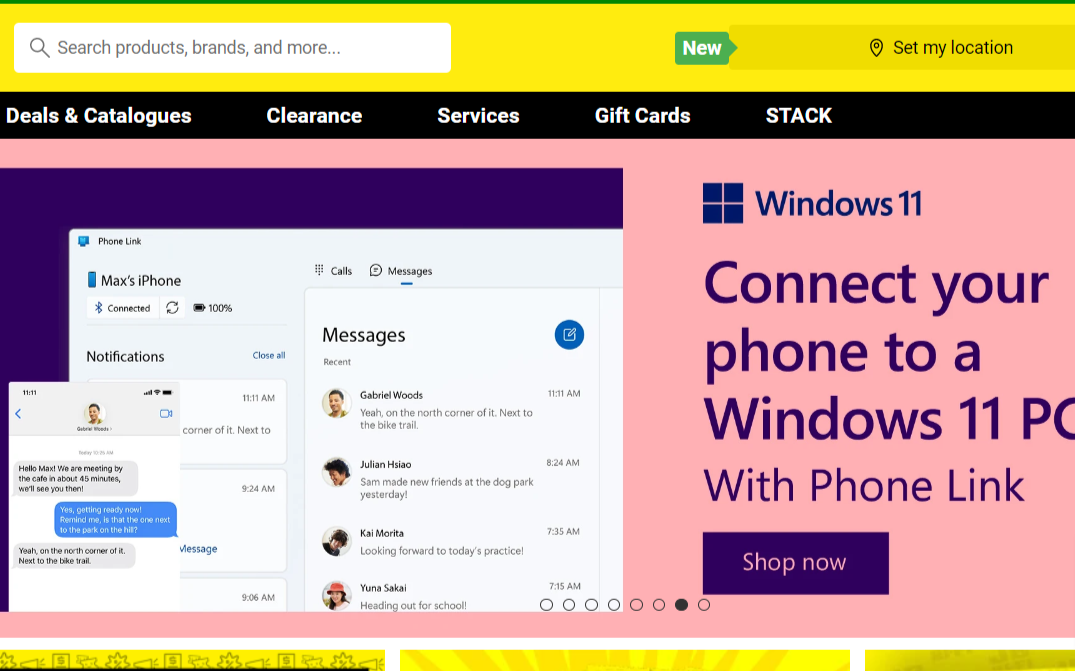

As e-commerce businesses expand, they often find themselves becoming restricted by the boundaries of existing commerce platforms. Consequently, many firms have created individualized stores that align with their brand aesthetics. This is understandable: customers demand a holistic brand experience that endures across various mediums.
You must try for more than what is achievable with a standard or custom theme to get the desired outcome. Your product pages should be unique and not look like anyone else’s. You deserve fast website loading, an abundance of customisation options, and the freedom to be creative in design.
Good news – the future is here! Look no further than Shopify Hydrogen, which offers extraordinary features to help you take advantage of headless e-commerce. But what exactly is Hydrogen? Is it worth your time and effort?
We will provide an overview of Shopify Hydrogen and answer any questions you may have, as well as review some examples.
Improve Your Site Performance
Using Shopify Hydrogen in a headless fashion opens the doors to first-rate site performance, particularly page speed. Cutting the front-end off from its backend grants you access to lightning-fast loading capabilities while preserving all the dynamic information and features in the back end. With this change, your Core Web Vitals can be bolstered and you may reduce the time it takes for your pages to load from seconds to milliseconds.
By using Shopify’s headless solution, you can offer a fully dynamic and customized experience quickly without sacrificing speed on your server or website. With this, you are sure to satisfy any customers and visitors to your store.
Scaling Made Simple
Scalability can often be an issue when attempting to increase site speed. Prior to Hydrogen, designers faced difficulty in attempting to optimize a site while remaining cognizant of both speed and user experience. Experienced developers recognize the relative ease of providing an individualized and dynamic shopping journey with swift online performance in situations where there is limited traffic.
When your store begins to expand, the website can become overwhelmed by the influx of customers, which leads to sluggish speed and performance. Fortunately, Shopify Hydrogen created Oxygen as a worldwide hosting solution for their stores, which will become available in 2023. With it, you won’t need to turn to an external service provider since your store will be hosted directly on Oxygen.
Designing Outside the Box
Hydrogen offers you the flexibility to customize your storefront using a headless approach, which separates the UI of your Shopify site from its backend. This grants you limitless design possibilities and allows you to create unique user experiences that visitors won’t forget.
A page-builder tool designed for Hydrogen shops can make the design process faster and more efficient. Shopify merchants don’t need any technical or design knowledge to use it – they simply drag and drop the layout, or choose from template and block options to create pages.
Thanks to the API connection between your Shopify website’s front and back ends, you don’t need to stress about making changes to the frontend design interfering with backend operations – like is usually the case for traditional commerce sites.
Creating an Outstanding Commerce Experience
Amazon product recommendations may be a common example of personalized marketing for eCommerce businesses, but most non-headless companies can’t take advantage of such a strategy. Shopify Hydrogen offers an easy, lightweight solution for any Shopify store, which provides flexibility in the frontend and a CMS. With this tool, merchants have complete control over storefront design and content management to create experiences that satisfy customers.
Furthermore, Shopify Hydrogen offers a remarkable shopping experience by providing a page loading time of less than a millisecond and maintaining a steady online performance. It is crucial to consider the store’s characteristics as well as the customers’ requirements in order to create an extraordinary experience.
Fast-Tracking Your Projects
Shopify Hydrogen could make front-end development quicker while still supplying merchants with countless design possibilities by implementing the foundational framework and pre-built UI components. Moreover, Hydrogen helps to reduce any intricacy which has in times past been tied to integrating third-party software and creating a custom storefront.
Thus, Shopify Hydrogen makes it easier for Shopify businesses to adopt the top headless commerce capabilities without having to go through a long and costly development process.
Stay Ahead of the Curve
As a cutting-edge e-commerce platform, Shopify Hydrogen is built on modern web technologies such as React, GraphQL, and Next.js. These technologies are known for their flexibility, scalability, and efficiency in building high-performance web applications. By leveraging these tools, Shopify Hydrogen provides businesses with a future-proof solution that enables them to stay ahead of the curve in an ever-changing digital landscape. With {keyword} being core components of its architecture, Shopify Hydrogen ensures that businesses can easily adapt to changing market demands while keeping up with evolving user needs for years to come. As a result, companies can focus on delivering outstanding customer experiences without worrying about constantly updating their technology stack or investing in expensive upgrades down the line.
Why Every Business Needs a Mobile First
In today’s fast-paced digital world, mobile devices have become an indispensable part of our daily lives. With the increasing number of people using smartphones and tablets to access the internet, it has become essential for businesses to adopt a mobile-first approach to website design. This is where Shopify Hydrogen comes in – a powerful tool that enables businesses to build storefronts optimized specifically for small screens and touch interactions. By utilizing advanced technologies such as responsive design and CSS3 media queries, Shopify Hydrogen ensures that your website looks great on any device – be it a desktop computer or a handheld smartphone. Moreover, with its intuitive user interface and robust set of features, this platform makes it easy for even non-technical users to create stunning mobile-friendly websites in no time at all. So whether you’re launching a new e-commerce store or revamping an existing one, adopting a mobile-first strategy with Shopify Hydrogen will undoubtedly give you an edge over the competition!
Shopify Hydrogen Trends
Shopify Hydrogen is a new development framework that offers a more modular approach to building online stores. This means that developers and store owners can more easily customize their stores and add new features and functionality as needed.
Here are some potential Shopify Hydrogen development trends that you might want to consider:
- Headless commerce: Hydrogen allows for a headless approach to building online stores, which means that the front-end and back-end can be decoupled. This trend is likely to continue in the future, as it allows for more flexibility and customization.
- Progressive Web Apps (PWAs): PWAs are web applications that can function like native apps on mobile devices. With Hydrogen, it is possible to create PWAs that provide a fast and seamless user experience. We might see more online stores adopting PWAs as they become more popular.
- AI-powered personalization: With Hydrogen, it is possible to integrate AI-powered personalization tools that can help online stores provide more relevant and personalized experiences to their customers. We might see more stores using AI-powered personalization to improve customer retention and increase sales.
- Microservices architecture: Hydrogen’s modular approach allows for the use of microservices, which can make it easier to build and maintain complex e-commerce applications. We see that more developers are adopting a microservices architecture for their Hydrogen-based applications.
- Augmented Reality (AR): Hydrogen supports AR capabilities, which can help online stores provide a more immersive and engaging shopping experience. In the future, more online stores will use AR to showcase their products and provide a more interactive experience for customers.
- Expansion into new services: Shopify Hydrogen is currently primarily focused on theme and storefront development, but there’s potential for it to expand into other areas of Shopify development. For example, it could be used to create custom reports, develop new apps, or streamline other development processes.
It’s important to note that these are just potential trends and the e-commerce landscape is constantly evolving. As such, it’s important to stay up-to-date with the latest developments and be willing to adapt and pivot as necessary.
Here are some additional details about each of these trends:
Headless commerce: Headless commerce is an approach to building online stores where the front-end and back-end are decoupled. This means that the front-end can be built using any technology, while the back-end can be hosted on Shopify. This gives developers and store owners more flexibility and customization options.
Progressive Web Apps (PWAs): PWAs are web applications that can function like native apps on mobile devices. They can be installed on the user’s device, they can work offline, and they can be launched from the home screen. PWAs provide a more seamless and engaging user experience than traditional web applications.
AI-powered personalization: AI-powered personalization is the use of artificial intelligence to provide more relevant and personalized experiences to customers. This can be done by using AI to analyze customer behavior and preferences, and then using that information to recommend products, services, and content. AI-powered personalization can help online stores improve customer retention and increase sales.
Microservices architecture: Microservices architecture is a software design pattern that breaks down a large application into smaller, independent services. Each service is responsible for a specific function, and they communicate with each other through well-defined APIs. Microservices architecture makes it easier to build and maintain complex applications, and it can also make applications more scalable and resilient.
Augmented Reality (AR): Augmented reality (AR) is a technology that superimposes a computer-generated image on a user’s view of the real world. AR can be used to enhance the shopping experience by allowing customers to see products in 3D, try them on virtually, and learn more about them. AR is becoming increasingly popular, and it is likely to be used more and more in online stores in the future.
Expansion into new services: Shopify Hydrogen is currently primarily focused on theme and storefront development, but there’s potential for it to expand into other areas of Shopify development. For example, it could be used to create custom reports, develop new apps, or streamline other development processes. As Shopify Hydrogen continues to evolve, it is likely to become a more powerful and versatile tool for building online stores.


